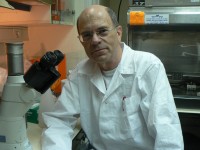This is the first time that the largest and most influential organization in the world in cancer research is giving the award to an Israeli researcher

Prof. Yossi Shilo, a researcher at the Sackler Faculty of Medicine at Tel Aviv University, won the AMERICAN ASSOCIATION FOR CANCER RESEARCH award. This is an extraordinary decision by the largest, oldest and most influential organization in the world in cancer research, which for the first time in its history will award one of its prestigious research awards - the Clowes Award - to an Israeli researcher. "Prof. Shiloh is an international leader in his field and an extraordinary scientist," wrote Dr. Margaret Fotti, the organization's CEO, in the reasons for the award, noting that "his work sparked a scientific revolution and opened new horizons in understanding how the living cell deals with DNA damage ., which are among the main causes of cancer".
The award will be given to Prof. Shiloh at the beginning of April in Orlando, Florida, at the annual scientific conference of the American Association for Cancer Research, which includes approximately 33,000 cancer researchers, doctors and survivors from ninety countries around the world. This conference, which presents what is happening at the forefront of cancer research and attracts about 18,000 researchers from around the world, is the highlight of the association's activities. At the conference, the association awards a number of awards, representing various aspects of the human struggle with cancer, and one of the most important of them is the Clouse Award. This award is usually given to American researchers: of the 50 researchers who have won this award since 1961, only four were not American citizens, and this is the first time it has been awarded to an Israeli researcher.
At the award ceremony, Prof. Shiloh's achievements will be presented to the plenary of the conference participants, and he will give a scientific lecture.
Protection mechanisms against damage to the hereditary material
Prof. Sheila's field of research is understanding the mechanisms that allow the cell to overcome damage caused to the hereditary material (DNA), as a result of the damage of environmental factors, such as radiation and various chemicals. These defense mechanisms are essential for preserving cell life and preventing cancer. Congenital damage to them causes severe hereditary diseases, extreme sensitivity to the causes of damage and an over-propensity to cancer. On the other hand, the understanding of these mechanisms is important for improving cancer treatment, based on the controlled and targeted use of radiation and various chemicals.
Prof. Sheila began this research in the late seventies, in his early days as a research student. The urge to deal with the subject was caused by his meeting with an Israeli family, where a hereditary disease known as AT was discovered. He chose this disease as the subject of his doctoral thesis, and his research on the disease continues to this day. In this rare and severe disease, the mechanism that protects our body from damage from ionizing radiation and various chemicals, which break the DNA molecule, is damaged. This mechanism works all the time to repair the damage that is constantly caused to DNA. by environmental and internal factors. In its absence, serious damage to the nervous system and the immune system and an excess tendency to cancer, characteristic of AT patients, are caused. The disease has been found in all populations of the world, but in Israel and the Palestinian Authority there is a notable concentration of dozens of families affected by the disease.
At the beginning of his research on the disease, Prof. Shiloh contributed to the knowledge of the basic defect in the disease - a poor response to DNA breaks. However, the mechanism of dealing with these damages remains unknown. The breakthrough was achieved in 1995, when the gene damaged in the disease was discovered in Prof. Sheila's laboratory at Tel Aviv University. It turned out that this gene encodes a key protein, which activates the damage response mechanism - a branched network of processes, which this protein plays like an orchestra. In AT patients, the protein does not exist, as a result of a defect in the gene responsible for its production, and the network is not activated. Since then, the laboratory has been investigating this network, and discovering new branches in it. "Our great hope," says Prof. Sheila, "is that understanding this branched and complex mechanism will enable new ways of treating the disease, and other diseases caused by deficiencies in our protection against DNA damage."
Prof. Yossi Shiloh is a graduate of the Technion and holds an accredited degree and a doctorate from the Hebrew University of Jerusalem. He studied at Harvard and Michigan Universities and the US National Institutes of Health, and since 1985 he has been a faculty member at Tel Aviv University. He is a member of the Israeli National Academy of Sciences and in 2005 won the A.M.T. in cancer research.
